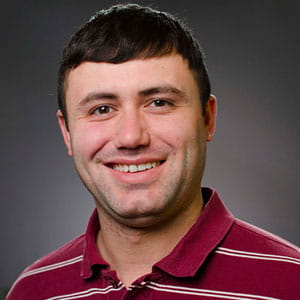Final 2015 Strategic Plan Town Hall With President Fry Held in Center City
 By Frank Otto
By Frank Otto
More than 100 people gathered in Geary Auditorium B in the New College Building Monday for the last of President John A. Fry’s four scheduled town hall meetings to discuss the refreshed goals of the University’s strategic plan.
Over the span of a month, Fry spoke to at least 500 faculty and professional staff members about the direction planned for Drexel over the next four years, as laid out in the next phase of the plan, “Transforming the Modern Urban University.”
“This round, the questions have been terrific,” Fry said following the conclusion of the town hall. “They were strategic and focused on the future. I think you heard a lot of aspirations in those questions.”
Fry said he was encouraged by what’s come up during the Q&A sessions in each town hall. The faculty and professional staff displayed a willingness to drive Drexel forward and through its long-term goals.
Getting feedback through the town halls is invaluable, Fry said, and gives him a better understanding of what’s going on throughout the University.
“You pick up so much,” Fry said. “You get so many comments and questions and issues and I get to go back to my table with my colleagues and say, ‘What about this?’ and ‘What about that?’ and ‘We could do this better.’ For me, the input has been terrific. I hope it’s interesting for the people who were here and I hope they get something out of it as well.”
Responsibility Center Management/Recruitment
Since the town hall was held at Drexel’s Center City Campus, its audience skewed more toward the College of Medicine and College of Nursing and Health Professions, similar to the April 22nd town hall at the Queen Lane Campus.
During his presentation, Fry discussed two initiatives that are part of the refreshed goals of the strategic plan: the switch to Responsibility Center Management as a budget model for the University and the effort to refine recruitment methods to bring in students who are prepared and committed to stay at Drexel through graduation.
Both of those may not actually be huge changes for the College of Medicine, according to Fry.
“You’ve effectively been doing Responsibility Center Management since you became a part of Drexel University a dozen years ago,” Fry told the College of Medicine audience members. “We’re bringing that philosophy the College of Medicine has been running under to the rest of the University.”
Fry discussing recruitment changes, said College of Med's selective was has put it on firm ground #DUTownHall pic.twitter.com/kveDZApS1H
— DrexelNow (@DrexelNow) May 4, 2015
Fry said the College of Medicine’s selectivity standards when it comes to applicants already fell in line with the new plan being implemented at the University.
Benefits of Better Relationship With Tenet
Similar to the Queen Lane Campus town hall, Fry discussed improvements in Drexel’s relationship with Tenet Healthcare Corporation.
With better relationship with Tenet, possibility of 3rd party leasing on new projects on Center City Campus #DUTownHall
— DrexelNow (@DrexelNow) May 4, 2015
Fry said there are talks about a potential new academic health care center in Philadelphia that would be a joint venture between Drexel and Tenet.
“We are making enormous progress in our relationship with Tenet,” Fry said. “It may not be visible to all of you with the shortcomings of this facility [on the Center City Campus] but I can tell you dealing with Tenet now is a night-and-day experience [compared to previously].”
Fry said there has been a lot of interest in partnering with Drexel College of Medicine lately bc of "tradition and excellence" #DUTownHall
— DrexelNow (@DrexelNow) May 4, 2015
Graduate College Initiative
Another subject that came up was Drexel’s newly announced Graduate College.
Several of the questions during the Q&A session Monday dealt with the impact of the Graduate College on how individual schools and colleges deal with their graduate students.
Fry said the Grad College would centralize some graduate student policies but not interfere with individual schools/colleges #DUTownHall
— DrexelNow (@DrexelNow) May 4, 2015
Adding a graduate college is mostly about “smoothing the experience” of graduate students, Fry said.
Interim Provost James Herbert, who has been appointed the inaugural dean of the Graduate College, explained that the Graduate College will aim to “strike the right balance” between a University-level policy and the autonomy that programs now have with their students.
“In no way is this graduate college looking to interfere with those programs but rather to partner,” Herbert said. “The goal is not to take a heavy-handed approach in any way but, at the same time, we’ve had so much decentralization to the point that we’ve not actually had advocacy at the senior administrative level for the graduate programs.”
“I don’t expect that our undergraduate population is going to grow,” Fry said. “What we’re more interested in is driving quality and keeping those incoming classes around the 2,500–2,900 level. If we want to think about growth at Drexel, it’s going to either be in the graduate programs or online division.”
“If we think about growth, we should think about it in a coordinated way,” he continued. “I think another thing that might come in with the Graduate College is to have a collective conversation about where we want to go, to what markets and to what scale and be sure that this is all going to be supported right away.”
Town Hall concludes. Pres Fry posing with members from Uganda contingent here to work with Drexel faculty #DUTownHall pic.twitter.com/Duf7NZY1sH
— DrexelNow (@DrexelNow) May 4, 2015
In This Article
Drexel News is produced by
University Marketing and Communications.
